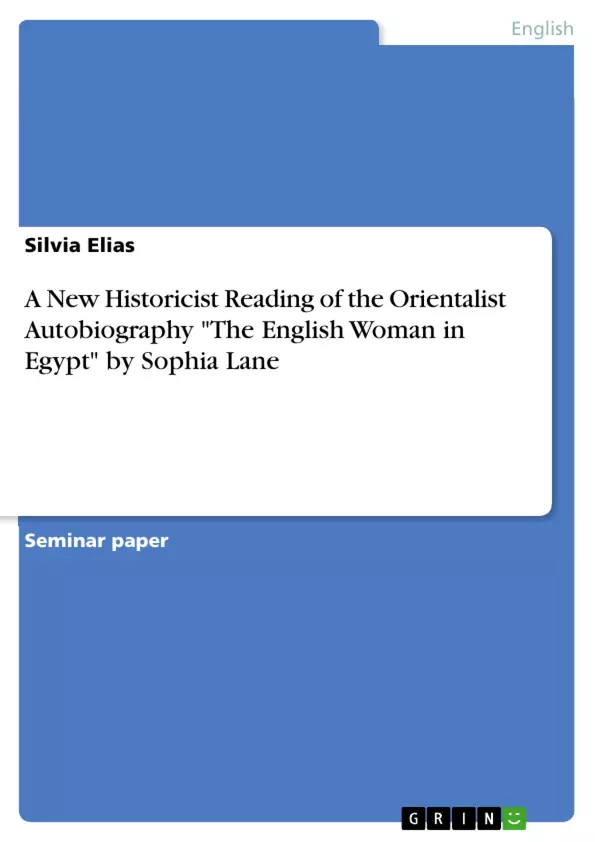Sophia Lane was the sister of the famous orientalist Edward William Lane, who suggested that she and her sons join him in Egypt so that she could report on the female side of Egypt's gender-segregated society. The result was her book of letters "The Englishwoman in Egypt: Letters from Cairo". Like her brother, Lane adopted local customs and dress in order to gain acceptance in Egyptian social circles. However, Lane herself hated veiling, and writes that she veiled only in order to gain access to harems, bathhouses, and other "women-only" areas.
Her autobiography is extremely interesting for the average European reader who reads about the exotic strange Orient with its weird habits and customs as well as the modern scholar who finds it a rich source of information about an important period in the history of Egypt specially that it covers the everyday life more than the historical events as seen from an external point of view. She writes "Imagine the face covered closely by a muslin veil, double at the upper part, the eyes only uncovered and over a dress of coloured silk an overwhelming covering of black silk extending in my idea in every direction. I looked with dismay at the donkey I must mount which was waiting for me. Nothing can be more awkward and uncomfortable than this riding dress." (Lane 38)
There are lots of other bizarre incidents (according to the Europeans) in the book like the belief of the appearance of the “Efreet” and the servants leaving the family, the phenomenon of “el sarab” or the mirage, Ramadan habits including the severity of fasting, the night call of prayer by the “Mueddins” and “el mesaharaty” calling people to have a final last chance meal before fasting, the description of mosques from the inside through her dashing adventure, marriage without seeing the future wife, Muslim ceremonies regarding the dead, cemeteries and the hired mourners, the description of public baths for females and the harem.
Inhaltsverzeichnis (Table of Contents)
- Sophia Lane's "The Englishwoman in Egypt: Letters from Cairo"
- Orientalism and the Representation of the "Other"
- New Historicist Perspective: Power, Narratives, and Marginalized Voices
Zielsetzung und Themenschwerpunkte (Objectives and Key Themes)
This work examines Sophia Lane's "The Englishwoman in Egypt: Letters from Cairo" through a New Historicist lens, exploring how the text reflects the cultural and societal dynamics of its time. The study delves into the interplay of power, representation, and the construction of "the Other" within the context of Orientalism.
- Orientalism as a lens for understanding European perceptions of the East
- The role of gender and social class in shaping Lane's experiences and observations
- The interplay of personal narratives and the dominant historical narratives of the time
- The impact of colonialism and imperialism on the representation of Egypt and its people
- The significance of marginalized voices and the challenges of constructing a comprehensive historical understanding
Zusammenfassung der Kapitel (Chapter Summaries)
- Sophia Lane's "The Englishwoman in Egypt: Letters from Cairo": This chapter introduces Sophia Lane and her autobiography, "The Englishwoman in Egypt: Letters from Cairo," highlighting her unique perspective as a woman observing Egyptian society. It explores her motivations for writing the book and her experiences navigating the gendered norms of Egyptian culture.
- Orientalism and the Representation of the "Other": This section delves into Edward Said's theory of Orientalism and its implications for understanding Lane's work. It analyzes how European perceptions of the East were shaped by cultural biases and how these perceptions influenced the construction of "the Other."
- New Historicist Perspective: Power, Narratives, and Marginalized Voices: This chapter examines Lane's autobiography through a New Historicist lens, focusing on the interplay of power, historical context, and the representation of marginalized voices. It explores how Lane's work contributes to a broader understanding of historical narratives and the challenges of representing diverse perspectives.
Schlüsselwörter (Keywords)
The key terms and concepts central to this study include Orientalism, New Historicism, gender, social class, colonial discourse, representation, marginalized voices, "the Other," and the construction of historical narratives.
Frequently Asked Questions
Who was Sophia Lane and why did she go to Egypt?
Sophia Lane was the sister of orientalist Edward William Lane. She traveled to Egypt to report on the female side of its gender-segregated society, which was inaccessible to male travelers.
What is "New Historicism" in the context of this study?
New Historicism is a literary theory that examines a text within its cultural and historical context, focusing on power dynamics, marginalized voices, and how narratives reflect their era.
How did Sophia Lane view the practice of veiling?
Lane personally disliked veiling, describing the riding dress as "awkward and uncomfortable," but she adopted it solely to gain access to female-only spaces like harems and public baths.
What aspects of Egyptian life did Lane describe?
She documented everyday life, including Ramadan customs, marriage ceremonies, female public baths, funerals, and local beliefs like the "Efreet" (spirits).
How does the study analyze Orientalism in Lane's work?
The study uses Edward Said’s theory of Orientalism to analyze how European perceptions and cultural biases shaped Lane’s representation of the "Other."
- Quote paper
- Silvia Elias (Author), 2013, A New Historicist Reading of the Orientalist Autobiography "The English Woman in Egypt" by Sophia Lane, Munich, GRIN Verlag, https://www.grin.com/document/283523



